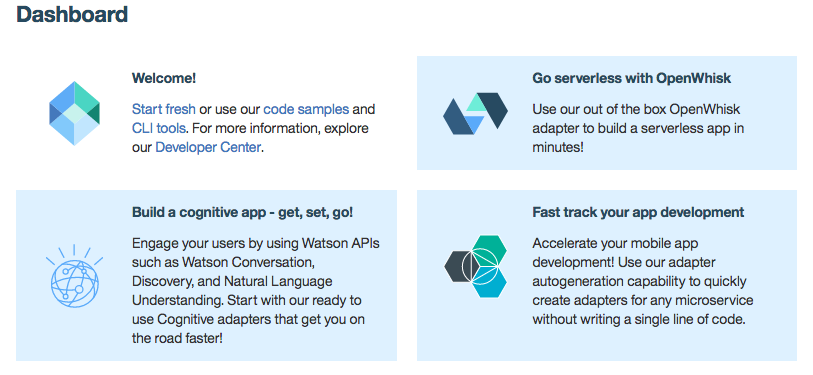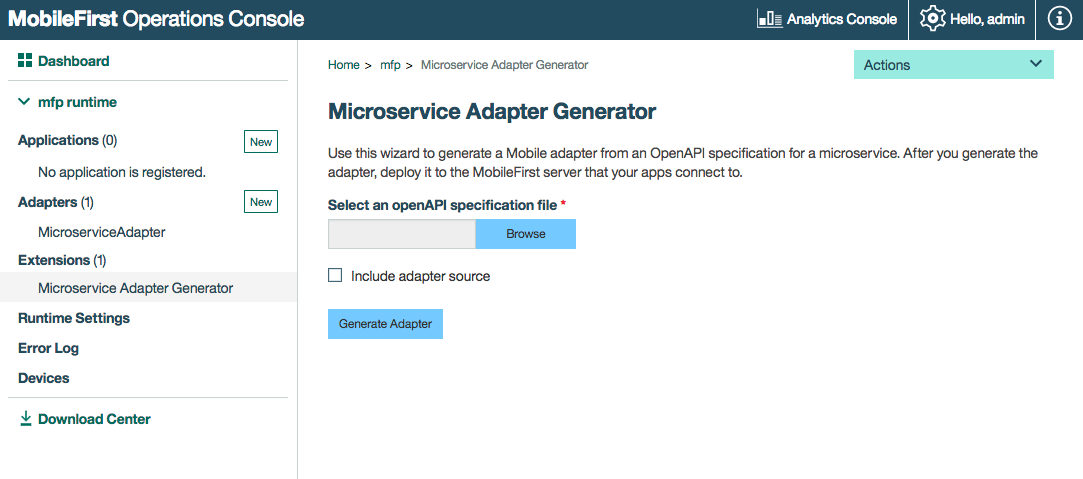Auto Generate Mobile Foundation Adapters for Microservices and backend systems from its OpenAPI Specification
Shinoj Zacharias, Yathendra P Neela May 07, 2018
MobileFirst_Foundation AdapterAuto-generation of Adapters
As a developer creating applications, you can significantly optimize the time you spend on backend coding by auto-generating adapters for your back-systems and microservices. Use the auto-generation of adapters feature in IBM Mobile Foundation 8.0 on-prem to generate a MobileFirst Platform adapter from the OpenAPI specification of the microservices/back-end systems. By using this feature, you can now focus on the application logic instead of creating the Mobile Foundation adapter, which connects the application to the desired back-end service. The adapter generated can be deployed to Mobile Foundation Service on IBM Cloud to be used in the mobile applications.
Overview of Adapters
Adapters are Maven projects that contain server-side code implemented in either Java or JavaScript. Adapters are used to perform any necessary server-side logic, and to transfer and retrieve information from backend systems to client applications and cloud services. See more on Developing Adapters.
Challenges in developing Adapters
An adapter can be created using either Maven commands or by using the MobileFirst CLI. The adapter code needs to be written by the developer using the IDE of their choice, such as Eclipse or IntelliJ. The developer writes the server-side code that often connects to the backend services to transfer or retrieve information, which is eventually used by the client applications or the cloud service. This means that the developer needs to fully understand the backend service APIs and need to implement the integration logic by themselves. Java adapters can use server-side Java APIs to perform operations that are related to MobileFirst Server, such as calling other adapters, logging to the server log, getting values of configuration properties, reporting activities to Analytics and getting the identity of the request issuer. It would be easy for the developers if the adapter code can be generated automatically for a backend system/service. See more on Creating Adapters.
OpenAPI specification
The OpenAPI Specification, originally known as the Swagger Specification, is a specification for machine-readable interface files for describing, producing, consuming, and visualizing RESTful Web services. OpenAPI specification is adopted by many companies as the industry standard for defining REST APIs. OpenAPI specifications are the key to supporting a great toolchain for developers and is used for documenting the REST APIs. One of the greatest benefits of using OpenAPI Specification is that it can be used to generate the client libraries in a variety of programming languages, these client APIs can be used easily to transfer and retrieve information from the backend systems and services.
Auto-generation of Adapter from OpenAPI Specification
IBM MobileFirst Foundation Platform provides an extension Adapter that can be used to auto-generate adapters from OpenAPI specification. The extension adapter takes an OpenAPI specification, either json or yaml file, and generates the adapter from the Open API specification, using the client libraries generated from the OpenAPI specification, it then downloads the generated adapters. The adapter that is generated and downloaded can then be deployed to Mobile Foundation Server and can directly be used by the client applications. You can optionally download the adapter source code as zip file. The adapter source file can be modified and the adapter can be re-built. This takes the pain out from developers who would otherwise need to spend substantial time on developing the adapters instead of focusing on building the client applications.
Note: Adapter Generation Feature is available on Mobile Foundation Devkits only. To use the adapter generation feature, JDK must be installed on the machine where Mobile Foundation is installed and the JAVA_HOME environment variable should be set to the installed JDK path.
Microservice Connector - Extension Adapter for generating adapter from OpenAPI Specification
IBM MobileFirst Foundation Platform ships an Extension Adapter, called Microservice Connector, that can be download from the Download Center of MobileFirst Operations Console. This adapter needs to be downloaded and deployed on to the Mobile Foundation Server.
MobileFoundation Dashboard showing information on fast tracking app development using adapter autogeneration feature:

Microservice Connector adapter, also known as Microservice Adapter Generator, can be downloaded from the Tools tab of the Download Center.

Once deployed the Adapter will appear under the Extensions category in the left navigation pane of the MobileFirst Operations Console. Clicking the Microservice Adapter Generator will open the page where one can select the OpenAPI specification (.json or .yaml file) of the microservice/backend system, to generate the adapter. Once the adapter is generated, the generated adapter will be automatically downloaded. Optionally you can also download the adapter source code as zip and modify the adapter and can be re-built. Note that the first request to generate the adapter can take a while as Mobile Foundation needs to download a lot of maven dependencies that are requried for the adapter generation. The subsequent generation will be faster as maven dependencies are already stored in Maven local repository.

How to get a functional and consumable adapter generated from OpenAPI specification
The correctness of the adapter generated depends on the OpenAPI specification. There may be cases where OpenAPI specification does not match the REST API of the backend service. In such a case, even if the adapter generation is successful, the call from adapter to the backend will not work because of the mismatch between the specification and the REST API defined by the microservices/backend system. In this case, unless the specification is corrected, a fully functional adatper will not be generated.
Add Security in OpenAPI specification
For the adapter to connect to backend systems, security definitions should be added to the OpenAPI specification. Adapter generator supports BASIC and API Key authentication only.
For BASIC authentication, security definition specification needs to be added to the specification file. Here is a json sample :
"securityDefinitions": {
"basicAuth": {
"type": "basic",
"description": "HTTP Basic Authentication."
}
},
"security": [
{
"basicAuth": []
}
]
For API Key authentication, security definition specification needs to be added to the specification file. Here is a json sample :
"securityDefinitions": {
"clientIdHeader": {
"type": "apiKey",
"in": "header",
"name": "X-IBM-Client-Id"
}
},
"security": [
{
"clientIdHeader": []
}
]
Add host and basepath in OpenAPI specification
Ensure that the host with correct schemes is provided in the specification and also in the basePath of the API
"host": "gateway.watsonplatform.net",
"schemes": [
"https"
],
"basePath": "/natural-language-understanding/api"
Add Custom Scope for Adapter REST Endpoints
If there is no scope added in the OpenAPI specification, a DEFAULT_SCOPE is added to all the REST endpoints. A custom scope can either be added at the global level or at the operational level, here is an example of adding scope globally.
"securityDefinitions": {
"basicAuth": {
"type": "basic",
"description": "HTTP Basic Authentication."
},
"OauthSecurity": {
"type": "oauth2",
"flow": "implicit",
"scopes": {
"adminauth": "Admin scope",
"customauth": "custom scope"
}
}
},
"security": [
{
"basicAuth": []
},
{
"OauthSecurity": [
"customauth"
]
}
]
Here is an example of overriding the global scope at the operational level
"paths": {
"/v1/workspaces": {
"parameters": [
{
"$ref": "#/parameters/VersionQueryParam"
}
],
"post": {
"summary": "Create workspace",
"description": "",
"tags": [
"Workspaces"
],
"security": [
{
"basicAuth": []
},
{
"OauthSecurity": [
"adminauth"
]
}
],
"consumes": [
"application/json"
],
"produces": [
"application/json"
],
...
...
Empty Response Object
If there is an empty reponse object in the specification, MFP has issue with generation of the adapter, so we recommend to remove the empty reponse object in openAPI specification
Here is an example of an empty response object :
"responses": {
"200": {
"schema": {
"$ref": "#/definitions/EmptyObject"
},
"description": "Successful request."
},
"EmptyObject": {
"properties": {}
}
In the above example, EmptyObject does not have any properties defined and is empty. Mobile Foundation will have an issue with the generation of the adapter in such scenarios, in this case we recommend to remove the EmptyObject schema from the response object, which means, the above specification should be changed to :
"responses": {
"200": {
"description": "Successful request."
}
}
Missing Consumes and Produces Content-types in specification
All the REST endpoints in the OpenAPI specification should have Consumes and Produces Content-types. The generated adapter can fail in calling the backend service if this is not specified or incorrectly given in the specification
"consumes": [
"application/json"
],
"produces": [
"application/json"
]
Mismatch in specification on request and response contents
Many of the OpenAPI specifications are not usually updated with the changes in the backend REST API. This can result in the adapter call failures due to the content mismatch. Make sure that the request and response contents in the specification matches with what is defined by the backend REST API
Inclusive terminology note: The Mobile First Platform team is making changes to support the IBM® initiative to replace racially biased and other discriminatory language in our code and content with more inclusive language. While IBM values the use of inclusive language, terms that are outside of IBM's direct influence are sometimes required for the sake of maintaining user understanding. As other industry leaders join IBM in embracing the use of inclusive language, IBM will continue to update the documentation to reflect those changes.




